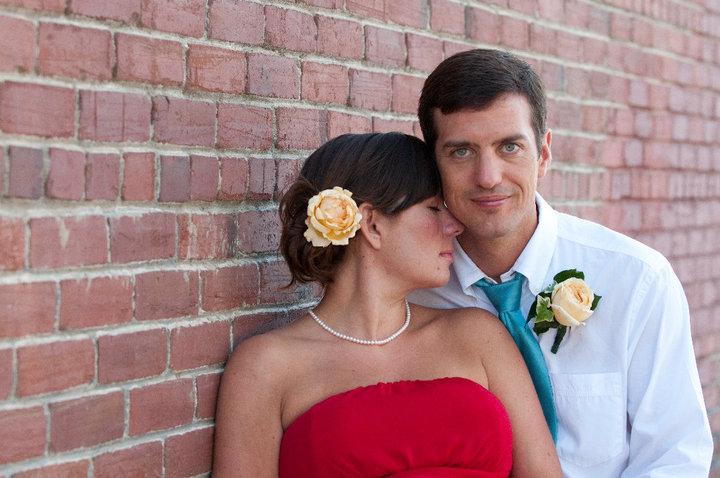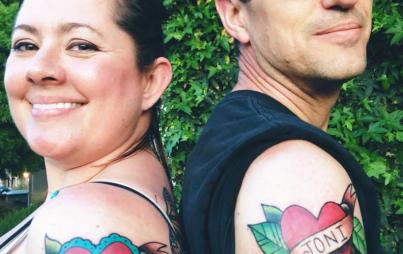
Photo Credit: Myron Yeung
This morning, I pushed my husband. I didn’t push him very hard, just enough to send a clear message that I did not want, or need, his help. He looked at me with a combination of anger and confusion. I felt a deep, pervasive shame, for my inability to control myself, but even more so for my inability to accept his love.
It was a particularly difficult morning. Our daughter refused to go to school. This is a thing that happens often — as a result of her anxiety disorder — but, regardless, it is a thing that is embarrassing. Other parents turn as she holds onto the car window or door. The office staff looks at us; I imagine they are thinking we have no idea how to parent this child.
And sometimes, even much of the time, we don’t. We feel like we should. I’ve already raised three children to adulthood. The fact that I can’t seem to raise this one without hysteria on a regular basis makes me feel incapable. My husband feels incapable too. We watch her struggle and wonder what we could (or should) be doing. We feel shame. We feel pain. We often take it out on each other.
So, as it sometimes happens, we were having an emotional, verbal argument. He tried to “reset” (a technique we use when one of us has the sense of calm and awareness to start the conversation over) by hugging me and telling me he understood that I felt overwhelmed by the task of raising this child well. I stood stiffly. I did not want his love, especially not in such a visceral way. And yet, he tried to give it to me, to ease that deep pain of incapability. Ultimately I shoved him out of my path.
You Might Also Like: 10 Things The Adult Child Of An Addict Wants You To Know
I shoved him because I do not need him. I do not need anyone.
This isn’t a trait I cultivated; it’s one I learned from a childhood of being my own parent. The child of an alcoholic learns early that needing only leads to disappointment. We learn how to be the caregiver — not only to ourselves, but to our siblings, and often our parent as well. This type of self-sufficiency becomes the baseline of our existence — so deeply ingrained that we do not even know it has taken over our lives.
We build walls. We hide behind our capability, our perceived strength. And while we shield ourselves from the cruel reality of our memories; we also shield ourselves from the hope for our future. We do not know any other way. We do not know how this prevents us from receiving love, acceptance, and help. The irony is we need these things. We so profoundly need these things that we cannot allow ourselves to; the risk of disappointment is just too great.
I learned not to need my mother. I learned this by coming home to an empty house. She taught me never to trust her by making me her parent. I became a mother to my mother when I was six.
I tried to raise my mother the best I could, but I didn’t do a very good job. Despite my best efforts, she stayed an alcoholic. She went to bed every night after drinking Pepto Bismol from the bottle with a straw, after beckoning me to get her a warm washcloth to remove what was left or her tear-streaked makeup. She continued to live the roller coaster of bipolar disorder without treatment; she took me along as her unwitting, unwilling passenger.
She taught me how to not need her, or anyone else.
It is because of this profound sense of necessary inner strength that I do not ask for or accept help. It is the reason I will take on and take on and continue to take on until I have no bandwidth to take on anything else — and then I will take on some more. It is because of this deep-seated need for control of my surroundings that I cannot allow others to see that under my capable exterior, I am a wounded child in need of not just the love of those around me, but the love of the years of lacking.
And my experience is not unique; it’s actually rather universal for those who have been raised by an alcoholic parent.
We report the same complex feelings:
Perfectionism — because we believe this is the route to love .
Need for control — because we lacked it.
Lack of trust — because our basic needs were often not met.
Approval seeking behavior — because we did not have it.
Fear of abandonment — because we were either emotionally or physically abandoned.
A need for chaos — because chaos is the place we are comfortable, because conflict is our normal.
Can you imagine living a life where chaos is your normal?
And we hide these things. We feel so painfully, desperately alone in this experience and yet we are surrounded by people who have had the same experiences. Our shame has kept us silent. Our strength has prevented us from dissolving the barriers between us and joy.
After I pushed my husband, I cried alone in the shower. I wept because I pushed him, and because that’s something my mother would have done. I sobbed for my child I cannot figure out how to help. I mourned the loss of my childhood and the way no one helped me. I lamented my inability to accept love. The water poured over my face, mixing with my tears until they were one stream of the most profound sadness. I watched them go down the drain. I imagined that it was that easy to let go, to let people see me.
After I thought my crying was over, I apologized to him, and he held me, and I cried some more. I told him I needed him. I opened the door to my heart and told him not only did I desperately need him, but that I was desperately afraid to need him — and he told me he would be there.
What I learned from today, and what I continue to learn every day I will allow myself to feel, is that the pain inside me can be healed; I just need to allow it.







